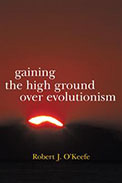
 |
O'Keefe has chosen to take the road less traveled in the often heated debate between creationism and evolutionism. He believes that both positions have merit; the problem lies in how science and religion are regarded in our culture. The issue was personified for many by the 1925 Scopes trial in Tennessee—the famous case in which two great legal minds argued whether evolution was to be taught in public schools. But the crux of this debate really began, O'Keefe asserts, with the very beginnings of science. When Galileo defied Christian doctrine by proving with a telescope that the earth was not the center of the universe, but instead revolved around the sun, the basic divide between faith and science was established; "Divine revelation was out, and reason was in."
The author examines many aspects of science—geology, astrology, biology, physics—yet is also willing to state that “the resurrection of Jesus Christ from the dead is one of the most verifiable facts of history.” He believes that because we generally do not question the findings of science, we have surrendered the possibilities inherent in “supernatural” explanations, and, thus, we will continue to grapple with this conflict. He posits a middle way: embracing philosophy, which combines inner experience with outer evidence, calling on both a grasp of scientific methodology and a validation of "rationality, purpose and goodness" that science does not provide.
O'Keefe, who has a Master of Science degree, writes in an admirably astute manner, clearly having constructed his thesis with care after diligent research. He provides copious footnotes and manages to make this complex subject matter accessible to serious readers. The issues he examines are significant and bear sincere consideration—consideration to which he has quietly but firmly opened the door with this thought-provoking study.
RECOMMENDED by the US Review